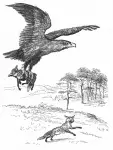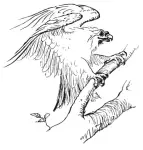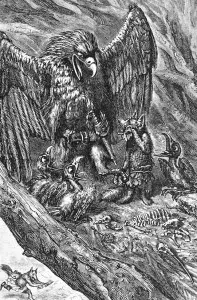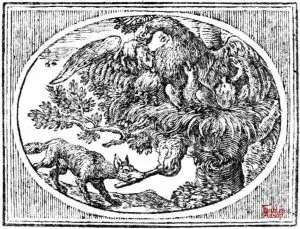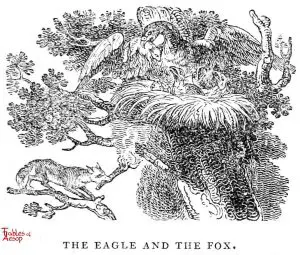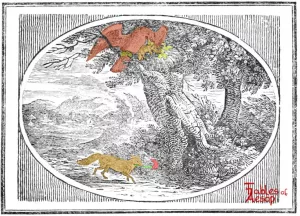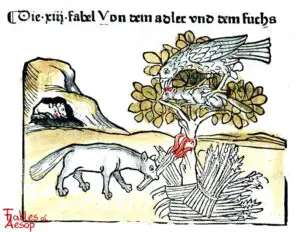An Eagle and Fox befriended each other. The Eagle, hungry, brought a Fox kit to her young. The Fox was delighted when some hot meat burned the Eagle’s nest.
God is the ultimate judge.

Townsend version
An eagle and a Fox formed an intimate friendship and decided to live near each other. The Eagle built her nest in the branches of a tall tree, while the Fox crept into the underwood and there produced her young. Not long after they had agreed upon this plan, the Eagle, being in want of provision for her young ones, swooped down while the Fox was out, seized upon one of the little cubs, and feasted herself and her brood. The Fox on her return, discovered what had happened, but was less grieved for the death of her young than for her inability to avenge them. A just retribution, however, quickly fell upon the Eagle. While hovering near an altar, on which some villagers were sacrificing a goat, she suddenly seized a piece of the flesh, and carried it, along with a burning cinder, to her nest. A strong breeze soon fanned the spark into a flame, and the eaglets, as yet unfledged and helpless, were roasted in their nest and dropped down dead at the bottom of the tree. There, in the sight of the Eagle, the Fox gobbled them up.

Caldecott
An Eagle and a Fox entered into a covenant of mutual affection and resolved to live near one another, looking upon close intercourse as a way of strengthening friendship. Accordingly the former flew to the top of a high tree and built her nest, while the latter went into a bush at the foot and placed her litter there. One day, however, when the Fox was away foraging, the Eagle, being hard pressed for food, swooped down into the bush, snatched up the cubs and helped her own fledglings to devour them. When the Fox came back and saw what had happened she was not so much vexed at the death of her young ones as at the impossibility of requital. For the Eagle having wings and she none, pursuit was impossible. So she stood some distance away and did all that is left for the weak and impotent to do—poured curses on her foe. But the Eagle was not to put off for long the punishment due to her violation of the sacred tie of friendship. It happened that some country-people were sacrificing a goat, and the Eagle flew down and carried away from the altar some of the burning flesh. But when she had got it to her eyrie a strong wind got up and kindled into flame the thin dry twigs of the nest, so that the eaglets, being too young to be able to fly, were roasted, and fell to the ground. Then the Fox ran up and, before the Eagle’s eyes, devoured them every one.

JBR Collection
[Note: The JBR Collection version of this fable has a completely opposite outcome for the Eagle and the Fox kit. Often translations will differ depending on how the translator reads the original and their life and times.]
An Eagle, looking around for something to feed her young ones with, spied a Fox’s cub basking in the sun. She swooped upon him, and was about to carry him off, when the old Fox came up, and, with tears in her eyes, implored the Eagle, by the love which she, as a mother, felt for her own young, to spare this, her only child. The Eagle, whose nest was in a very high tree, made light of the Fox’s prayers, and carried the cub to her brood. She was about to divide it among them, when the Fox, bent upon revenge, ran to an altar in a neighbouring field on which some country people had been sacrificing a kid, and seizing thence a flaming brand, made towards the tree, meaning to set it on fire. The Eagle, terrified at the approaching ruin of her family, was glad to give back the cub, safe and sound, to his mother.

Samuel Croxall
[Note: The Croxall and Bewick versions mirror the JBR version in the outcome.]
AN Eagle that had young ones, looking out for something to feed them with, happened to spy a Fox’s Cub, that lay basking itself abroad in the sun. She made a stoop, and trussed it immediately; but before she had carried it quite off, the old Fox coming home, implored her, with tears in her eyes, to spare her cub, and pity the distress of a poor fond mother, who should think no affliction so great as that of losing her child. The Eagle, whose nest was up in a very high tree, thought herself secure enough from all projects of revenge, and so bore away the cub to her young ones, without showing any regard to the supplication of the Fox. But that subtle creature, highly incensed at this outrageous barbarity, ran to an altar, were some country people had been sacrificing a kid in the open fields, and, catching up a firebrand in her mouth, made towards the tree where the Eagle’s nest was, with a resolution of revenge. She had scarce ascended the first branches, when the Eagle, terrified with the approaching ruin of herself and family, begged of the Fox to desist, and, with much submission, returned her the cub again safe and sound.
THE APPLICATION
This fable is a warning to us not to deal hardly or injuriously by any body. The consideration of our being in a high condition of life, and those we hurt far below us, will plead little or no excuse for us in this case. For there is scarce a creature of so despicable a rank, but is capable of avenging itself some way, and at some time, or other. When great men happen to be wicked, how little scruple do they make of oppressing their poor neighbours! they are-perched upon a lofty station, and have built their nest on high; and, having outgrown all feelings of humanity, are insensible of any pangs of remorse. The widow’s tears, the orphan’s cries, and the curses of the miserable, like javelins thrown by the hand of a feeble old man, fall by the way, and never reach their heart. But let such a one, in the midst of his flagrant injustice, remember, how easy a matter it is, notwithstanding his superior distance, for the meanest vassal to be revenged of him. The bitterness of an affliction, even where cunning is wanting, may animate the poorest spirit with resolutions of vengeance; and when once that fury is thoroughly awakened, we know not what she will require before she is lulled to rest again. The most powerful tyrants cannot prevent a resolved assassination; there are a thousand different ways for any private man to do the business, who is heartily disposed to it, and willing to satisfy his appetite for revenge, at the expence of his life. An old woman may clap a firebrand in the palace of a prince, and it is in the power of a poor weak fool to destroy the children of the mighty.

Thomas Bewick (The Eagle and The Fox)
An Eagle that had young ones, looking for something to feed them with, happened to spy a Fox’s Cub that lay basking itself abroad in the sun: she made a stoop, and trussed it immediately; but before she had carried it quite off, the old Fox coming home, implored her, with tears, to spare her Cub, and pity the distress of a poor fond mother, who would think no affliction so great as that of losing her child. The Eagle, whose nest was high in an old hollow tree, thought herself secure from all projects of revenge, and so bore away the Cub to her young ones, without shewing any regard to the supplications of the Fox. But that subtle creature, highly incensed at this outrageous barbarity, ran to an altar, where some country people had been sacrificing a kid in the open fields, and catching up a fire-brand in her mouth, made towards the tree where the Eagle’s nest was, with a resolution of revenge. She had scarcely reached its root, when the Eagle, terrified with the approaching ruin of herself and family, begged of the Fox to desist, and, with much submission, returned her the Cub safe and sound.
APPLICATION.
When men in high situations happen to be wicked, how little scruple do they make of oppressing their poor neighbours! They are perched upon a lofty station, and, having outgrown all feelings of humanity, are insensible to the pangs of remorse. The widow’s tears, the orphan’s cries, and the curses of the miserable, fall by the way, and never reach their hearts. But let such, in the midst of their flagrant injustice, remember how easy it is, notwithstanding their superior distance, for the meanest vassal to take his revenge. The bitterness of affliction (even where cunning is wanting) may animate the poorest spirit with desperate resolutions; and when once the fury of revenge is thoroughly awakened, we know not what she may effect before she is lulled to rest again. The most powerful tyrants cannot prevent a resolved assassination: there are a thousand different ways for any private man to do the business, who is heartily disposed to it, and willing to satisfy his appetite for revenge, at the expence of his life. An old woman may clap a fire-brand to the palace of a prince, and a poor weak fool may destroy the children of the mighty.

L’Estrange version
There was a bargain struck up betwixt an eagle and a fox, to be wonderful good neighbours and friends. The one took-up in a thicket of brushwood, and the other timber’d upon a tree hard by. The eagle, one day when the fox was abroad a forraging, fell into his quarters and carry’d away a whole litter of cubbs at a swoop. The fox came time enough back to see the eagle upon wing, with her prey in the foot, and to send many a heavy curse after her; but there was no overtaking her. It happen’d in a very short time after this, upon the sacrificing of a goat, that the same eagle made a stoop at a piece of flesh upon the altar, and she took it away to her young: but some live coales it seems, that stuck to’t, set the nest a fire. The birds were not as yet fledge enough to shift for themselves, but upon sprawling and struggling to get clear of the flame, down they tumbled, half roasted, into the very mouth of the fox, that stood gaping under the tree to see the end on’t: So that the fox had the satisfaction, at last, of devouring the children of her enemy in the very sight of the damm.
Moral
God reserves to himself the punishment of faithless, and oppressing governours, and the vindication of his own worship and altars.

Heinrich Steinhöwel (Of the Eagle and the Vixen)

Aquila et Vulpes
Dum vulpis proles foris excurrebant, ab aquila comprehensae, matris fidem implorabant. Accurrit vulpes aquilamque rogat ut captivam prolem dimittat. Aquila, nacta praedam, ad pullos subvolat. Vulpes, correpta face quasi nidum incendio absumptura esset, insequitur. Trepidans aquila, “Parce,” inquit, “mihi parvisque liberis, et tuum quidquid habeo reddidero.”
Moral
Per aquilam potentis atque audacis animi homines intellegendi sunt; per vulpem, pauperculi.
Perry #001

